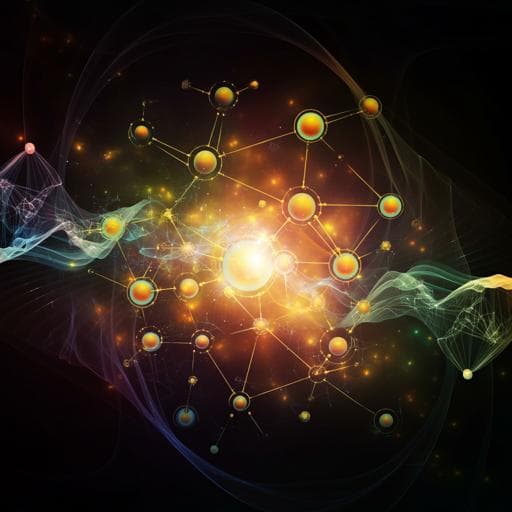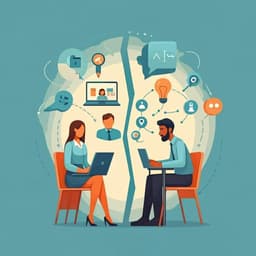
Psychology
Unpredictable benefits of social information can lead to the evolution of individual differences in social learning
P. V. D. Berg, T. Vu, et al.
The study addresses why there is substantial variation in humans’ reliance on social learning across societies, individuals, and over development. Although social learning is central to human adaptability, prior work often assumes fixed, hard-coded learning strategies. The authors propose and formalize the idea that social learning strategies themselves can be learned through development. They model the evolution of developmental programmes that allow individuals to flexibly adjust their reliance on social versus individual learning based on past experiences. The central hypothesis is that developmental flexibility in social learning evolves when social learning is beneficial for some individuals but not for others; under such uncertainty, individuals benefit from learning whether social information is useful for them personally, leading to stable individual differences in reliance on social learning.
The paper situates its contribution within extensive literature on cultural evolution and social learning. Prior theoretical and empirical work documents wide variation in social learning across societies, individuals, and development, and shows that such variation affects group dynamics, diffusion of innovations, cooperation, and cultural evolution. Classic models often assume fixed, genetically encoded social learning strategies and homogeneous payoffs for cultural traits across individuals. Recent perspectives argue that social learning strategies may themselves be learned, and that individuals’ goals, needs, preferences, and local conditions can create heterogeneous payoffs for adopting the same cultural traits. The authors build on these insights by allowing developmental, experience-dependent adjustment of reliance on social learning and by relaxing the assumption of homogeneous payoffs, thereby linking uncertainty in the value of social information to the evolution of individual differences.
The authors develop an individual-based evolutionary simulation with a population of 1000 individuals evolving over 10,000 non-overlapping generations. Each individual faces ten sequential decisions about adopting cultural traits per lifetime. Traits yield payoffs of +1 (beneficial) or −1 (detrimental), with five of each per individual. Individuals choose either social learning (probability S) or individual learning (probability 1−S) to assess a trait’s payoff. Assessment is noisy: individual learning draws a payoff estimate from a normal distribution centered on the true payoff with SD=1. Social learning averages payoff estimates from 10 other models, with noise SD depending on scenario. Adoption occurs only if the assessed payoff is positive. Individuals accumulate payoffs (baseline 5 to avoid negative fitness). A small fitness cost for flexibility is imposed: total payoff minus 0.01×flexibility parameter. Developmental programme and inheritance: Each individual has two heritable, continuously varying parameters: S0 (initial reliance on social learning for the first decision) and flexibility (denoted A, Δ, or λ in text; magnitude of adjustment in S after each learning outcome). After each learning event, S is updated by ±A: increase S by A after positive social learning or negative individual learning; decrease S by A after negative social learning or positive individual learning, bounding S to [0,1]. Offspring inherit parental S0 and A with independent mutation probability 0.001 each; mutation adds a normal deviate N(0,0.05). If S0 mutates outside [0,1], it is clipped; A is floored at 0. Flexibility starts at 0 in the initial generation; S0 is initialized uniformly in [0,1]. Reproduction is proportional to accumulated payoff. Scenarios examined:
- Scenario 1 (effectiveness of social learning): Vary the SD of noise on social learning payoff assessments to set average social learning effectiveness: high (SD=0.1), intermediate (SD=3.5), low (SD=5.0). Introduce individual differences by drawing each individual’s social-learning noise SD from a gamma distribution with the specified mean and varying SD (controls degree of between-individual variation). Individual learning SD is fixed at 1.0.
- Scenario 2 (heterogeneous payoffs): All individuals have identical learning accuracies (SD=1.0 for both types), but individuals differ in “payoff profiles” (which specific traits are beneficial/detrimental) drawn from a beta distribution. The mean of the beta controls degree of individual variation (0 to 0.25 range explored), and its variance controls “clustering” (from low to high). High clustering produces two polarized groups with opposite payoff profiles; low clustering yields broadly overlapping profiles.
- Scenario 3 (assortment in social learning): Builds on Scenario 2 with individual variation fixed at 0.2 and clustering at 0.5. Individuals select social models assortatively by payoff-profile similarity. Each learner samples 100 candidates, transforms their pairwise similarities by raising to the power of an assortment parameter, then selects 10 models with probability proportional to these weights. Assortment=0 yields random learning; assortment=1 yields probability proportional to similarity; high assortment emphasizes most similar models. For each parameter combination (Scenario 1 means and SDs; Scenario 2 variation and clustering; Scenario 3 assortment), 200 replicate simulations are run; outcomes (evolved S0 and A) are recorded in the final generation.
Across all scenarios, developmental flexibility evolves when the value of social information is uncertain—i.e., when social learning benefits some individuals but not others—leading to enduring individual differences in reliance on social learning. When social learning is predictably beneficial (or predictably poor) for everyone, flexibility does not evolve and populations become homogeneous, relying strongly (or weakly) on social learning. Scenario 1 (effectiveness differences):
- High average effectiveness of social learning → evolution of high S0, low A (inflexible heavy social learners), minimal developmental change, no individual differences.
- Low average effectiveness → evolution of low S0, low A (inflexible individual learners), minimal developmental change.
- Intermediate average effectiveness: outcomes depend on between-individual variation in effectiveness. With high individual variation, flexibility A evolves, enabling effective social learners to increase S over development and ineffective ones to decrease S, producing a bimodal distribution of final reliance (clear individual differences). With low variation, flexibility does not evolve. Scenario 2 (heterogeneous payoffs):
- With little payoff-profile variation, social learning is broadly useful → high S0, low A.
- With high variation, social learning is broadly unhelpful → low S0, low A.
- Flexibility evolves at intermediate variation (around 0.1), especially when payoff differences are highly clustered. Under high clustering, a majority group shares payoffs so social learning benefits them, whereas a minority has opposite payoffs and benefits from individual learning. Flexibility allows majority individuals to increase S and minority individuals to decrease S, yielding pronounced individual differences. With low clustering, social learning is similarly (in)effective across individuals, so flexibility is not favored. Scenario 3 (assortment):
- Intermediate assortment yields the highest evolved flexibility (and intermediate-to-high S0). Low assortment causes many to learn from dissimilar others, undermining social learning and selecting for low S0, low A. High assortment ensures learning from highly similar others, making social learning broadly beneficial and selecting for high S0, low A. Intermediate assortment creates conditions where social learning pays for some but not others, favoring flexibility and leading to individual differences. Overall, when uncertainty in the usefulness of social information exists due to effectiveness differences, heterogeneous payoffs, or intermediate assortment, selection favors flexible developmental programmes that generate stable individual variation in reliance on social learning.
The findings provide a general evolutionary explanation for individual differences in social learning: when individuals cannot a priori know whether social information will benefit them, selection favors developmental flexibility to adjust reliance on social versus individual learning based on experience. This mechanism yields some individuals who end up heavy social learners and others who rely primarily on individual learning. The work formalizes proposals that social learning strategies themselves are learned, showing that fixed strategies evolve only when the information environment is predictably favorable or unfavorable to social learning. The model connects population structure and heterogeneity in payoffs to the evolution of learning strategies and predicts societal patterns: higher reliance on social learning in populations with homogeneous payoffs (e.g., tight cultures, uniform environments) and lower reliance when payoffs are heterogeneous (e.g., diverse needs or environments). It further predicts majority-group members should rely more on social learning than minority members when assortment is not too strong, whereas very strong assortment could produce high social learning in both groups. The results align with broader theory on plasticity evolving under uncertainty and highlight the social environment (heterogeneous payoffs, assortment) as a source of such uncertainty.
The paper contributes an evolutionary model demonstrating that unpredictable benefits of social information select for developmental flexibility in reliance on social learning, generating stable individual differences. The model shows this mechanism across scenarios involving variable learning effectiveness, heterogeneous payoffs with varying clustering, and assortative social learning. When social information is predictably good or bad for all, fixed strategies evolve and populations are homogeneous; when usefulness varies across individuals, flexibility evolves and produces heterogeneity in reliance on social learning. Future research directions suggested by the authors include: allowing effectiveness to vary by trait and context to examine more gradual individual differences; exploring co-development and potential mutual reinforcement of individual and social learning abilities; incorporating alternative transmission pathways (e.g., teaching, social transmission) for S0 and flexibility; modeling strategic selection of similar payoffs as models; and studying specialization feedbacks (e.g., innovators vs networked social learners) on the evolution of flexibility and cultural dynamics.
Key simplifying assumptions may limit generalizability: fixed step-size updates of reliance (adding/subtracting the same A regardless of current S), binary and uniform trait payoffs (+1/−1) and equal learning effectiveness across traits; only two developmental parameters (S0 and flexibility) under genetic transmission, without cultural transmission of these parameters; payoff profiles and effectiveness differences are modeled as non-heritable draws; fixed number of traits (ten) and models (ten) for social learning; simple cost of flexibility; and no explicit modeling of specialization or feedback loops between learning type and future effectiveness. These choices likely accentuate bimodal outcomes; relaxing them may yield more graded individual differences.
Related Publications
Explore these studies to deepen your understanding of the subject.







